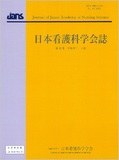Japanese
English
- 販売していません
- Abstract 文献概要
- 参考文献 Reference
要旨
目的:ICU勤務の看護師の睡眠の質と概日リズムの同調因子となる生活行動時刻を調査し,夜間の睡眠の質(睡眠効率:SE)に影響する可能性がある生活行動時刻を把握した.
方法:ICU勤務の看護師22名に5日間(休日,日勤日,夜勤入り日,夜勤明け日,休日)の生活行動調査とその期間の全3回の夜間睡眠状況をActiwatch®で測定した.さらに各夜間睡眠のSE別の2群(SE-good:SE≧85.0%,SE-poor:SE<85.0%)間で生活行動時刻の比較を行った.
結果:全対象のSE(中央値)は各夜間睡眠で85.0%以上であった.生活行動の比較では,夜勤明け日の夜間睡眠においてSE-goodとSE-poor間の夜勤後の初回食事摂取時刻(p=.017)に差があり,SE-goodは午前,SE-poorは午後に摂取する傾向にあった.
結論:ICU勤務の看護師のSEは概ね85%以上を維持していた.さらに夜勤後の朝食に相当する食事摂取時刻が夜勤明け日のSEに影響する可能性が示唆された.
Objective: This study investigated sleep quality of nurses working shifts in intensive care unit (ICU) and their other daily life activity times that are factors in synchronizing the circadian rhythm to better understand daily life activity times that may influence the night sleep quality (sleep efficiency: SE).
Methods: A survey was conducted with twenty-two ICU nurses on five-day daily life activities (holiday, day-time shift day, night shift day, day after a night shift, and holiday). The sleeping conditions of three nights during the five days were measured with Actiwatch®. We divided the nurses into two groups by each night SE score (SE-good: SE≥85.0%, SE-poor: SE<85.0%), and compared the daily life activity times for the two groups.
Results: The SE (median) of the participants in this study was above 85.0% for each night sleep. For the daily life activity times, the SE-good and SE-poor groups in the night sleep at day after a night shift showed differences in the time of first meal eaten after night shift (p=.017): the SE-good group tends to eat in the morning and the SE-poor in the afternoon.
Conclusions: Nurses working shifts in ICU largely maintained an SE above 85%. Further, the findings suggest that the time of eating meals, which corresponds to breakfast after a night shift, may influence the SE on the day after a night shift.
Copyright © 2023, Japan Academy of Nursing Science. All rights reserved.


